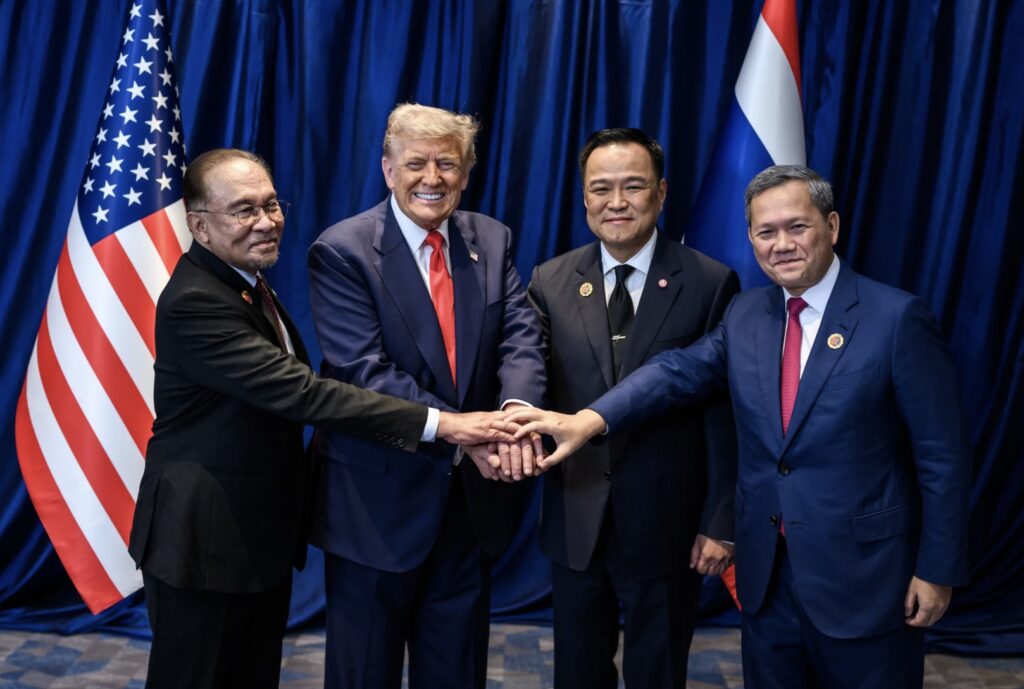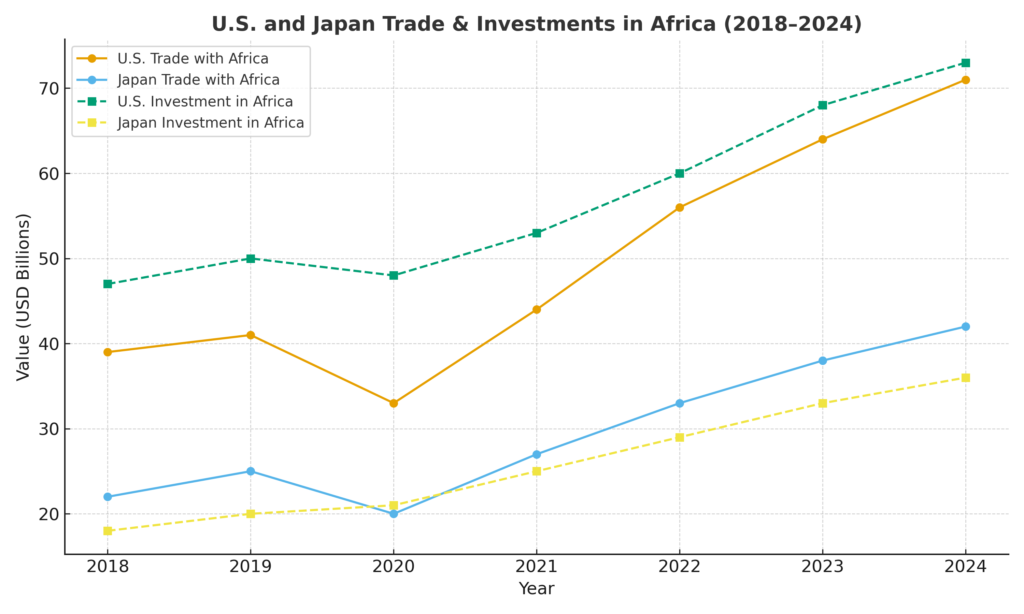— and a Wake-Up Call for Africa’s Economic Strategy
By Kemi Osukoya | The Africa Bazaar Magazine
U.S. President Donald J. Trump’s arrival in Tokyo on Monday marked the second leg of a high-stakes five-day Asia tour that’s quickly reshaping global trade alignments — and opening new questions about how Africa positions itself amid shifting economic power plays.
Fresh off a whirlwind ASEAN Summit in Malaysia, where Trump brokered trade and peace deals stretching from Cambodia to Malaysia to Thailand as well as critical minerals agreements across Southeast Asia, the U.S. President landed in Japan with a clear agenda: tighten economic alliances in Asia as tensions with China escalate — and project American influence in regions where Beijing has dominated trade for more than a decade.

Trump met Emperor Naruhito at the Imperial Palace before heading to his hotel for the night. Tomorrow, he will meet with Japan’s newly elected Prime Minister, Sanae Takaichi, Japan’s first female leader and a known ally of the late Shinzo Abe. Their discussions are expected to center on trade, tariffs, and technology supply chains, including a new deal that could reshape U.S.-Japan economic ties and ripple across global markets — Africa included.
“We’ve had a strong partnership with Japan for decades, but this is about building something bigger — a fairer, faster, freer trade relationship that benefits both sides,” Trump said ahead of the meeting. “Prime Minister Takaichi is a remarkable leader, and we’re getting things done.”
PARTNERS’ PRODUCTS
The best way to see the city. Book online and save
For her part, Prime Minister Takaichi expressed confidence that the new deal would “expand opportunity, strengthen industries, and secure our shared economic future.” Japan, she added, was “ready to support U.S. industries — from agriculture to clean energy — in a way that promotes global growth.”
The White House confirmed that the two leaders spoke on the phone. Last week, Trump congratulated the Prime Minister on her election victory.
The U.S. and Japan’s diplomatic relations date back to the mid-19th Century when a Treaty of Peace and Amity was signed in 1854, establishing diplomatic ties, followed by trade. However, the WWII conflict put a dent in that partnership. Post the WWII conflict, a new economic and security alliance was reestablished in 1952 and built upon in 1960, which allows for the largest U.S. troops to be based in Asia. Today, U.S.-Japan economic relationship is worth more than $319 billion in goods and services trade, with Japan exporting $180.8 billion to the U.S. and importing $128.4 billion in 2024. The two nations are now finalizing a $500 billion investment pact first signed in July — a package that includes massive U.S. agricultural exports, energy supplies, and cooperation on shipbuilding, artificial intelligence, and clean tech.
Japan’s Foreign Minister Motegi Toshimitsu, in a statement, welcomed the recent signing of a Peace Accord between Cambodia and Thailand. He called the Joint Declaration “tangible and steady progress… [that is] indispensable for the stability and development of the entire region ” and noted that he hopes it will ease tensions between the two countries once it has been implemented. He also thanked the diplomatic efforts and leadership of the U.S. and Malaysia.
For Trump, who has threatened to triple tariffs on Chinese goods unless Beijing offers concessions by November, Japan’s growing partnership offers an alternate pathway for securing global supply chains — especially around rare earth minerals and semiconductors.
Experts say this shift is not just about Asia; it’s a strategic recalibration of global trade flows that will inevitably affect African economies reliant on raw material exports and global capital inflows.
While in Japan, Trump is expected to meet with business executives and visit U.S. troops.
What It Means for Africa

The current Asia realignment, currently being led by Washington, Beijing and Tokyo is redrawing trade corridors that directly intersect with Africa’s resource and investment interests. Japan — a long-time investor in Africa’s energy and infrastructure — is now being encouraged by Washington to diversify away from Chinese-dependent supply chains. That could position African nations as alternative sources for critical minerals, clean energy projects, and manufacturing partnerships.
Africa’s African Continental Free Trade Area (AfCFTA) could become a crucial platform in this reordering. As global powers look to secure mineral and manufacturing bases outside of China, African nations with resources such as cobalt, lithium, and rare earth elements — notably in Namibia, Zambia, the Democratic Republic of Congo and South Africa— stand to benefit if they can negotiate strategically.
Economists warn, however, that Africa risks being left behind if it remains a passive observer in these negotiations.
“The U.S.-Japan trade pivot is a clear signal — the world’s biggest economies are building new lanes for commerce,” said a trade policy expert. “Africa must ensure it’s part of that map, not just a supplier of raw materials.”
The potential spillover effects from this alliance create new competition and opportunities for global investors. A strengthened U.S.-Japan bloc could channel fresh investment into Asian and African infrastructure, especially in energy transition projects and critical mineral value chains. Yet, it also intensifies competition for influence — with China still entrenched through BRICS and Belt and Road investments across the continent.
Japan, which recently has quietly but steadily been redrawing its economic map of Africa by positioning itself as a strategic alternative to China, is doubling down on soft-power diplomacy and investment-led engagement across the continent.
In its latest push, Japan, in August hosted African Heads of State and delegations in Yokohama for the Ninth Tokyo International Conference on African Development (TICAD 9), a flagship forum that underscored Tokyo’s ambition to move beyond aid and toward more equitable trade and investment partnerships, included Tokyo’s pledges and plans to ramp up investment on the continent—to mobilize $1.5 billion in impact investment over the next three years—targeting sectors from clean energy to infrastructure and agritech
At the summit, the Japan International Cooperation Agency unveiled the “JICA Africa Hometown Initiative”, a program designed to strengthen people-to-people ties and create new pathways for local economic collaboration. Under the initiative, four Japanese cities have been twinned with four African countries as official “hometowns,” a symbolic and practical pairing meant to promote direct municipal cooperation.
Analysts say the “hometown” approach reflects a growing recognition in Tokyo that influence in Africa will depend as much on relationships as on raw capital.
For African policymakers, the key question is whether these shifting trade alliances can be leveraged to unlock industrial growth, capital access, and technology transfer, rather than deepen dependency.
“Africa’s economic voice has grown stronger through forums like the G20 and BRICS,” said an Eswatini finance official who attended last month’s G20 Finance Ministers meeting. “But the emerging U.S.-Japan trade front reminds us that our seat at the table only matters if we can shape the menu.”
As Trump’s Asia tour continues — with a highly anticipated meeting with Chinese President Xi Jinping later this week in Seoul — global markets are watching closely. The outcomes of these negotiations could determine currency stability, commodity prices, and investor sentiment for months to come.
U.S. trade negotiators—led by Treasury Secretary Scott Bessent and United States Trade Representative Administrator Jamieson Greer and their Chinese counterparts spent the weekend hashing out details of a U.S.-China economic deal, which builds on their earlier trade pact in May.
For Africa, market analysts say this moment represents both risk and opportunity: a chance to attract diversified investment and forge stronger trade ties with democratic markets, or risk marginalization in a new era of economic bloc politics.
In the words of a former U.S diplomat: “The world’s trade winds are shifting east again — Africa can either catch the current or be swept aside by it.”
Following his meetings in Japan, Trump will head to South Korea for the final leg of his Asia tour where he will attend the annual Asia-Pacific economic Cooperation forum on Wednesday and hold a bilateral meeting with newly elected South Korean President Lee Jae Myung. He will wrap up his day with a state dinner with the leaders.
On Thursday, President Trump and Xi Jinping will meet face-to-face, their first official meeting during Trump’s second term.




